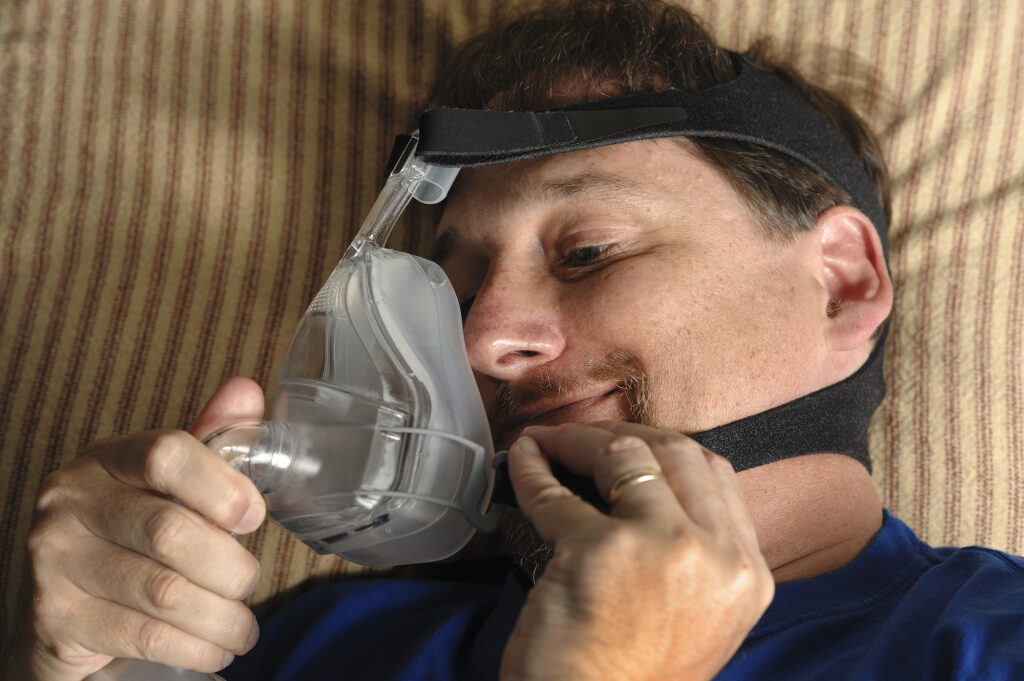New Study Shows CPAP Therapy Can Aid Memory Processes in the Brain

Over a billion people worldwide are estimated to have obstructive sleep apnea (OSA), a condition involving repeated breathing disruptions during sleep that may cause brief but frequent awakenings. Recently, researchers in Australia found clues that the symptoms of OSA may be caused not only by these awakenings but also by altered patterns of brain activity. In people with untreated OSA, the researchers observed irregular brain waves in a part of the brain involved in forming memories.
People with OSA often experience impaired memory and thinking. A second new study casts light on how OSA affects the brain and why treatment with a continuous positive airway pressure (CPAP) device can improve memory as well as breathing and sleep quality.
For the study, 11 people with OSA spent a night in a sleep lab. Before going to bed, they did a series of tasks to evaluate various elements of their memory and thinking.
While they slept, special equipment monitored their breathing and brain waves. In the morning, they repeated the thinking tests and were given a CPAP machine to use every night at home.
After three months of CPAP therapy, the participants returned to the sleep lab for the same tests and another sleep study. The researchers compared their brain waves, breathing, and memory between the two visits.
A key finding was that participants spent more time in deep sleep and rapid eye movement (REM) sleep and less time in lighter sleep stages when using a CPAP machine. Deep sleep and REM sleep improve memory and overall rest.

The study found that CPAP machine use was associated with positive changes in the patterns of brain waves. The researchers used equipment that provides details of electrical activity in different areas of the brain. With CPAP therapy, they saw fewer irregularities in the parietal region, the part of the brain that plays a role in memory.
CPAP use was also linked to better results on tests of procedural memory, such as remembering a sequence of finger taps. Participants with the most improvement in brain wave activity in the parietal area after CPAP therapy showed the greatest gains in procedural memory.
However, this study had noteworthy limitations. For example, the researchers didn’t find a difference before and after CPAP therapy on tests of other types of memory and thinking. It was also a small pilot study, so it can’t provide definitive conclusions. More in-depth research will be needed to show how CPAP therapy affects the intricate processes of memory formation during sleep.
Still, these findings support other recent research that found that breathing easier during sleep may boost memory. Along with the established benefits of OSA treatment for sleep and overall health, these studies point to another way that CPAP therapy can pay dividends for people with sleep apnea.
Got a hot tip? Pitch us your story idea, share your expertise with SleepFoundation.org, or let us know about your sleep experiences right here.
References
4 Sources
-
Gomez-Pilar, J., Gutiérrez-Tobal, G. C., Gozal, D., & Hornero, R. (2023). Are we missing something? Different obstructive sleep apnea phenotypes as a possible driver of discrepancies in cognitive recovery after continuous positive airway pressure treatment. Sleep, 46(12), zsad269.
https://academic.oup.com/sleep/article/46/12/zsad269/7326731 -
D’Rozario, A. L., Kao, C. H., Phillips, C. L., Mullins, A. E., Memarian, N., Yee, B. J., Duffy, S. L., Cho, G., Wong, K. K. H., Kremerskothen, K., Chapman, J., Haroutonian, C., Bartlett, D. J., Naismith, S. L., & Grunstein, R. R. (2023). Region-specific changes in brain activity and memory after continuous positive airway pressure therapy in obstructive sleep apnea: a pilot high-density electroencephalography study. Sleep, 46(12), zsad255.
https://academic.oup.com/sleep/article-abstract/46/12/zsad255/7287359?redirectedFrom=fulltext -
National Institute of Neurological Disorders and Stroke. (2023, July 19). Brain basics: Understanding sleep., Retrieved January 8, 2023, from
https://www.ninds.nih.gov/health-information/public-education/brain-basics/brain-basics-understanding-sleep -
Schreiner, T., Petzka, M., Staudigl, T., & Staresina, B. P. (2023). Respiration modulates sleep oscillations and memory reactivation in humans. Nature communications, 14(1), 8351.
https://www.nature.com/articles/s41467-023-43450-5












































































